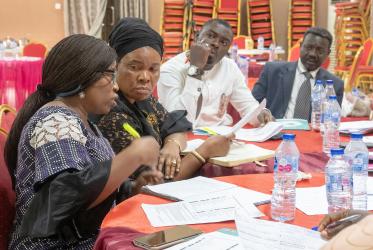Evangelische Brüder-Unität in Tansania
(Kanisa La Moravian Tanzania)
The first missionaries of the Moravian Church came to Tanzania in the late 19th century soon after Germany assumed control of the territory. The first Moravian mission station was established at Rungwe in Southern Tanzania in 1891. Another station in Western Tanzania was handed over to the Moravian Board in Herrnhut, Germany, by the London Missionary Society in 1897. As a result of active evangelism work, these two sister stations grew and became big churches extending over large areas in the southern and western parts of Tanzania. Each one constituted a province of its own. The need to establish cooperation between them was felt right from the beginning of their establishment. The founding missionaries had established communication through correspondence as early as 1899. Later they started meeting and exchanging experiences and the two provinces established cooperation on various matters. In 1965 it was agreed to establish formally a joint board to discuss and agree on matters common to both provinces. In 1968 the two provinces decided to establish a Moravian theological college as a joint venture for the training of ministers. In 1976 the southern province was divided into two, and the same was done with the western province in 1986. Since then the Moravian Church in Tanzania has four provinces.
With the creation of the new provinces the need to establish the Moravian Church in Tanzania as a national body to coordinate and unify the work became greater. The MCT as a church would run and oversee joint ventures and programmes and represent the provinces inside and outside the country. On August 4, 1986 delegates from the four Moravian provinces met at Sikonge and resolved to formally establish the MCT as a church to unite all Moravians in Tanzania. On November 23, 1986 the MCT was officially inaugurated and in April, 1987 it was registered by the government. The MCT was formally recognized by the Unity Synod of the Unitas Fratrum at its meeting in Antigua, West Indies in 1988.
The MCT coordinates and oversees the development and growth of the theological college, which has become, since 2004, Bishop Kisanji University. It is responsible for the publication of hymn books, liturgy and text books and other church literature produced by the Moravian Theological Commission. It represents the provinces before the government, other churches, agencies and ecumenical organizations. Above all, its major responsibility is, through the provinces, to preach the holy gospel of salvation within and outside the church. The church in Tanzania is growing and membership is increasing rapidly. Each province has a specific area for evangelization. Each province is also engaged in outreach work beyond the borders of the country, in the DRC, Malawi and Zambia.




